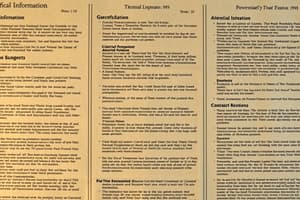Podcast
Questions and Answers
What satisfies the need-to-know in this case?
What satisfies the need-to-know in this case?
- Long history of working with classified materials
- Personal interest in the information
- Virtue of the officially assigned duty to escort classified information (correct)
- Training and experience
What are the regulatory requirements that must be satisfied before an authorized individual can hand-carry or escort classified materials?
What are the regulatory requirements that must be satisfied before an authorized individual can hand-carry or escort classified materials?
- Submitting a travel itinerary
- Having a government ID
- Receiving a courier briefing (correct)
- Getting a security clearance
What is the objective of the briefing?
What is the objective of the briefing?
To provide couriers with the appropriate procedures to safeguard classified information.
The briefing can be sectioned into ______.
The briefing can be sectioned into ______.
Before leaving a secure facility with classified materials, couriers must ensure their personal travel documents are in order.
Before leaving a secure facility with classified materials, couriers must ensure their personal travel documents are in order.
What may personal travel documentation include?
What may personal travel documentation include?
Couriers must inform only the addressee if the material was opened.
Couriers must inform only the addressee if the material was opened.
Couriers are finished with their tasks once the classified materials are delivered.
Couriers are finished with their tasks once the classified materials are delivered.
What must happen before the courier briefing for escorting or hand-carrying classified information?
What must happen before the courier briefing for escorting or hand-carrying classified information?
What should couriers ensure before leaving?
What should couriers ensure before leaving?
Match the following to their respective categories:
Match the following to their respective categories:
There is assurance of immunity from search by customs, police, or immigration officials.
There is assurance of immunity from search by customs, police, or immigration officials.
If the courier is not returning materials, what may they be required to produce?
If the courier is not returning materials, what may they be required to produce?
What should a courier have at the ready for border crossing?
What should a courier have at the ready for border crossing?
If it is necessary to travel by commercial passenger aircraft, what is required?
If it is necessary to travel by commercial passenger aircraft, what is required?
DD Form 2501 can authorize hand-carry or escort of classified materials when traveling on commercial aircraft.
DD Form 2501 can authorize hand-carry or escort of classified materials when traveling on commercial aircraft.
What must the letter of authorization include?
What must the letter of authorization include?
Which of the following must the letter of authorization specify?
Which of the following must the letter of authorization specify?
If it is necessary to travel by commercial passenger aircraft, all carriers involved should be foreign carriers.
If it is necessary to travel by commercial passenger aircraft, all carriers involved should be foreign carriers.
To hand-carry or escort classified materials, what must an individual have?
To hand-carry or escort classified materials, what must an individual have?
What are authorized locations for storing classified material during an overnight stay?
What are authorized locations for storing classified material during an overnight stay?
When traveling by commercial passenger aircraft, couriers may show the authorization letter to any TSA official that challenges the contents of the materials.
When traveling by commercial passenger aircraft, couriers may show the authorization letter to any TSA official that challenges the contents of the materials.
What should you use to prevent direct contact between your document and the inside of the inner wrapper?
What should you use to prevent direct contact between your document and the inside of the inner wrapper?
What should the receipt identify?
What should the receipt identify?
What is the purpose of using two layers of durable, opaque material?
What is the purpose of using two layers of durable, opaque material?
What do the terms transmission and transportation refer to?
What do the terms transmission and transportation refer to?
Guidance on protecting classified information varies from national-level policy to what?
Guidance on protecting classified information varies from national-level policy to what?
What does Executive Order 13526 prescribe?
What does Executive Order 13526 prescribe?
What DoD Instruction provides implementing guidance for transmitting and transporting classified information?
What DoD Instruction provides implementing guidance for transmitting and transporting classified information?
What does DoD 5220.22-M, NISPOM provide?
What does DoD 5220.22-M, NISPOM provide?
Who is responsible for establishing procedures for transmitting and transporting classified material?
Who is responsible for establishing procedures for transmitting and transporting classified material?
What should the sender of classified materials determine first?
What should the sender of classified materials determine first?
Transmission/transportation of classified materials is appropriate when the sender has the authority to share the material and the receiver has a legitimate need to know.
Transmission/transportation of classified materials is appropriate when the sender has the authority to share the material and the receiver has a legitimate need to know.
What factors should be ensured regarding the receiver's ability to protect classified information?
What factors should be ensured regarding the receiver's ability to protect classified information?
What is the primary factor to consider when selecting a method to transmit classified information?
What is the primary factor to consider when selecting a method to transmit classified information?
Which methods are authorized for sending Top Secret information?
Which methods are authorized for sending Top Secret information?
What methods can transmit Top Secret information?
What methods can transmit Top Secret information?
What type of transmission do authorized cryptographic systems provide?
What type of transmission do authorized cryptographic systems provide?
Which networks can computers use to transmit classified data?
Which networks can computers use to transmit classified data?
What should cleared U.S. military and civilian employees do when transmitting classified materials?
What should cleared U.S. military and civilian employees do when transmitting classified materials?
Couriers can carry classified information sent by secure means.
Couriers can carry classified information sent by secure means.
What is required before individuals can act as couriers or escorts?
What is required before individuals can act as couriers or escorts?
What types of materials may escorts accompany?
What types of materials may escorts accompany?
Hand-carrying classified information is always authorized.
Hand-carrying classified information is always authorized.
What mode of transport may be used for classified materials?
What mode of transport may be used for classified materials?
What must remain with the U.S. escort at all times?
What must remain with the U.S. escort at all times?
Where can U.S. military and government civilians courier classified materials?
Where can U.S. military and government civilians courier classified materials?
What clearance is required for defense contractors to transmit classified materials?
What clearance is required for defense contractors to transmit classified materials?
What method can authorized contractors use to transmit Secret information?
What method can authorized contractors use to transmit Secret information?
Foreign government information may only be shared with proper consent from the originating government.
Foreign government information may only be shared with proper consent from the originating government.
What do bilateral and multinational agreements ensure?
What do bilateral and multinational agreements ensure?
What must all international transfers of classified information take place through?
What must all international transfers of classified information take place through?
What is required before shipping classified information from another agency?
What is required before shipping classified information from another agency?
What must individuals requiring access to NATO classified information complete?
What must individuals requiring access to NATO classified information complete?
When transmitting classified NATO information, through which channels must it be sent?
When transmitting classified NATO information, through which channels must it be sent?
What is an authorized person defined as?
What is an authorized person defined as?
Flashcards
Transmission and Transportation of Classified Information
Transmission and Transportation of Classified Information
The process of physically transferring classified information from one person or location to another.
National Guidance
National Guidance
National-level policies and regulations that guide procedures for protecting classified information during transmission and transportation.
Executive Order 13526
Executive Order 13526
An executive order that establishes a uniform system for classifying, safeguarding, and declassifying national security information.
DoD Guidance
DoD Guidance
Signup and view all the flashcards
NISPOM (DoD 5220.22-M)
NISPOM (DoD 5220.22-M)
Signup and view all the flashcards
Sender's Authority
Sender's Authority
Signup and view all the flashcards
Storage Verification
Storage Verification
Signup and view all the flashcards
Classification Level
Classification Level
Signup and view all the flashcards
Impact of Material Attributes
Impact of Material Attributes
Signup and view all the flashcards
Geographic and Time Factors
Geographic and Time Factors
Signup and view all the flashcards
Top Secret and Secret Guidelines
Top Secret and Secret Guidelines
Signup and view all the flashcards
Methods for Top Secret
Methods for Top Secret
Signup and view all the flashcards
Cryptographic Systems
Cryptographic Systems
Signup and view all the flashcards
Data Networks
Data Networks
Signup and view all the flashcards
Official Courier Services
Official Courier Services
Signup and view all the flashcards
Courier Responsibilities
Courier Responsibilities
Signup and view all the flashcards
Modes of Transport
Modes of Transport
Signup and view all the flashcards
Custody Control
Custody Control
Signup and view all the flashcards
COMSEC
COMSEC
Signup and view all the flashcards
Sensitive Compartmented Information (SCI)
Sensitive Compartmented Information (SCI)
Signup and view all the flashcards
Special Access Programs (SAPs)
Special Access Programs (SAPs)
Signup and view all the flashcards
Foreign Government Information (FGI)
Foreign Government Information (FGI)
Signup and view all the flashcards
Third-Country Transfer
Third-Country Transfer
Signup and view all the flashcards
NATO Standards
NATO Standards
Signup and view all the flashcards
Regulatory Compliance
Regulatory Compliance
Signup and view all the flashcards
Courier Briefings
Courier Briefings
Signup and view all the flashcards
Documentation Checks
Documentation Checks
Signup and view all the flashcards
Pre-Trip Considerations
Pre-Trip Considerations
Signup and view all the flashcards
En Route Considerations
En Route Considerations
Signup and view all the flashcards
Border Crossing Procedures
Border Crossing Procedures
Signup and view all the flashcards
Post-Trip Considerations
Post-Trip Considerations
Signup and view all the flashcards
Commercial Air Travel
Commercial Air Travel
Signup and view all the flashcards
Letter of Authorization Requirements
Letter of Authorization Requirements
Signup and view all the flashcards
Carrier Guidelines
Carrier Guidelines
Signup and view all the flashcards
Authorized Storage for Classified Materials
Authorized Storage for Classified Materials
Signup and view all the flashcards
TSA Interactions
TSA Interactions
Signup and view all the flashcards
Document Handling
Document Handling
Signup and view all the flashcards
Packaging Security
Packaging Security
Signup and view all the flashcards
Study Notes
Transmission and Transportation of Classified Information
- Definition: Involves physical transfer of classified material from sender to recipient, utilizing both connective (cable, wire) and non-connective (radio, microwave, laser) methods.
- National Guidance: National-level policy influences command and activity-level procedures for protecting classified information during transmission and transportation.
Executive Orders and DoD Policies
- Executive Order 13526: Establishes a uniform system for classifying, safeguarding, and declassifying national security information.
- DoD Guidance: DoD Instruction 5200.01 and DoD Manual 5200.01 outline implementing guidance, including standards for transmitting and transporting classified information.
Contractor Regulations
- NISPOM (DoD 5220.22-M): Provides standards for transmitting and transporting classified information for contractors under the National Industrial Security Program.
Sender Responsibilities
- Sender's Authority: Prior to transmission, the sender must confirm the authority to share materials and the recipient's clearance and need-to-know.
- Storage Verification: Ensure recipient can securely store classified information, including checking facility capabilities and contacting security officials.
Transmission Considerations
- Classification Level: The method of transmission must align with the classification level of the information.
- Impact of Material Attributes: Size, weight, and type of material can dictate the best transmission method.
- Geographic and Time Factors: Consider geographic limitations, urgency, and dissemination restrictions when choosing a transmission method.
Authorized Transmission Methods
- Top Secret and Secret Guidelines: Methods authorized for transmitting Top Secret information are valid for lower classification levels; similar principle applies for Secret to Confidential materials.
- Methods for Top Secret: Direct contact, cryptographic systems, courier services, and diplomatic couriers are approved.
Security Systems and Networks
- Cryptographic Systems: Must be authorized by the Director of the National Security Agency and compliant with CNSSI No. 7003.
- Data Networks: Classified data can traverse systems like SIPRNET (up to Secret) and JWICS (up to Top Secret, SCI).
Courier Operations
- Official Courier Services: DCS and Department of State Diplomatic Courier Service manage secure classified document transmissions.
- Courier Responsibilities: Authorized personnel, including U.S. military and cleared contractors, may transmit classified material, ensuring secure storage arrangements at transit points.
Transport Protocols
- Modes of Transport: Surface and air (government-controlled or chartered) are allowed for classified materials.
- Custody Control: Classified information must remain under U.S. escort control during transport.
Special Categories of Information
- COMSEC: Designed to protect telecommunications. Requires approval by designated COMSEC custodians for transmission.
- Sensitive Compartmented Information (SCI): Requires approval from local SCI security officials for transport.
- Special Access Programs (SAPs): Require heightened safeguarding and coordination for dissemination.
International Regulations and Guidelines
- Foreign Government Information (FGI): Protection level aligns with originating government standards, shared only through government channels.
- Third-Country Transfer: Requires prior written consent from the originating government before disclosing FGI to any third country.
Security Agreements and Procedures
- NATO Standards: The U.S. maintains separate security procedures for NATO classified information, ensuring recipient authorization before transmission.
- Regulatory Compliance: Various protocols and must be followed, including consulting appropriate security authorities before shipping FGI, SCI, COMSEC materials, or SAP information.
Courier Briefings and Documentation
- Courier Responsibilities: Briefings cover pre-trip, en route, and post-trip considerations, ensuring couriers understand security protocols.
- Documentation Checks: Couriers must verify personal travel documents before departing with classified materials and report any opened packages to relevant security officers.### Pre-Trip Considerations
- Ensure personal travel documents are valid and current.
- Maintain one copy of inventory; another copy goes to the security office.
- Obtain disclosure authorization if sharing classified information with foreign nationals.
- Understand packaging requirements for classified materials.
- Report any suspicious contacts or incidents immediately.
En Route Considerations
- Couriers are responsible for the security of all materials during transit.
- Protect materials in emergencies; utilize pre-arranged secure storage as needed.
- Do not discuss materials publicly or deviate from the authorized travel schedule.
- Avoid leaving materials unattended or unsecured; unauthorized storage methods are prohibited.
- Materials should not be opened en route, except as specified under official demands.
Border Crossing Procedures
- Present courier authorization orders if official inquiries arise.
- Request to speak directly to a senior official if necessary.
- If required to open a package, do so in the official's presence and away from public view.
- Ensure that the package is properly repackaged after inspection and get the senior official's signature.
Post-Trip Considerations
- A receipt may be necessary if the courier isn’t returning materials, signed by the receiving organization's security officer.
- Materials must be properly sealed for re-inventory if returning to the original facility.
Commercial Air Travel
- A letter of authorization is mandatory for travel on commercial airline flights.
- Use DD Form 2501 for travel not involving commercial airlines, or when hand-carrying is required.
- Neither DD Form 2501 nor a written authorization statement can authorize hand-carrying on commercial aircraft.
Letter of Authorization Requirements
- Must include the individual’s full name, employing agency, identification, and description of materials being transported.
- Specify the point of departure, destination, and any known transfer points.
- Include issue and expiration dates, the issuer’s name, title, signature, and contact information for verification.
- If foreign travel is involved, the letter must be translated into the country's official language.
Carrier Guidelines
- Prefer U.S. airlines for commercial air travel; foreign carriers may only be used when no U.S. carrier is available.
- Authorization for hand-carrying classified materials requires a favorable security determination, a signed non-disclosure agreement, a need-to-know justification, and a courier briefing.
Authorized Storage for Classified Materials
- Authorized facilities for overnight storage include U.S. military facilities, U.S. embassies, and cleared contractor facilities.
TSA Interactions
- Authorization letters may only be shown to TSA officials questioning the contents of the materials.
Document Handling
- Prevent direct contact between classified documents and the inner wrapper; use a cover sheet or cardboard to separate them.
Packaging Security
- Two layers of durable, opaque materials minimize accidental exposure and theft risk, while enhancing detection of tampering.
Studying That Suits You
Use AI to generate personalized quizzes and flashcards to suit your learning preferences.




